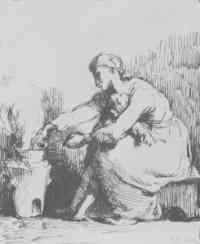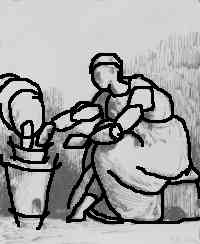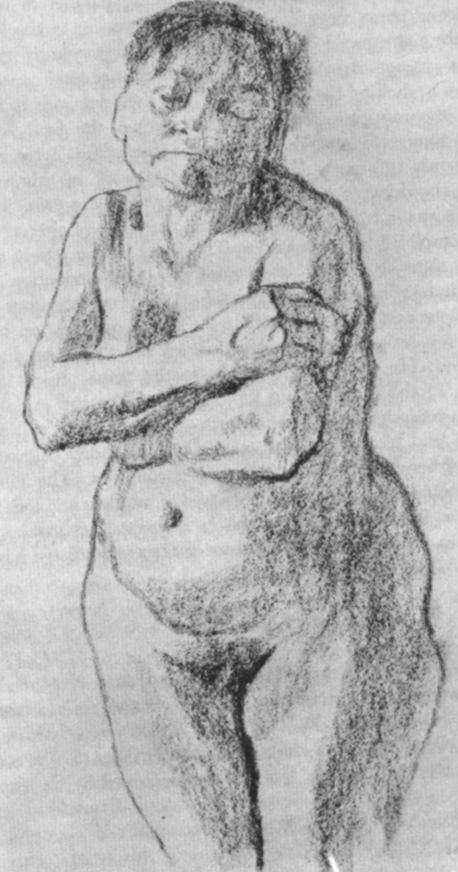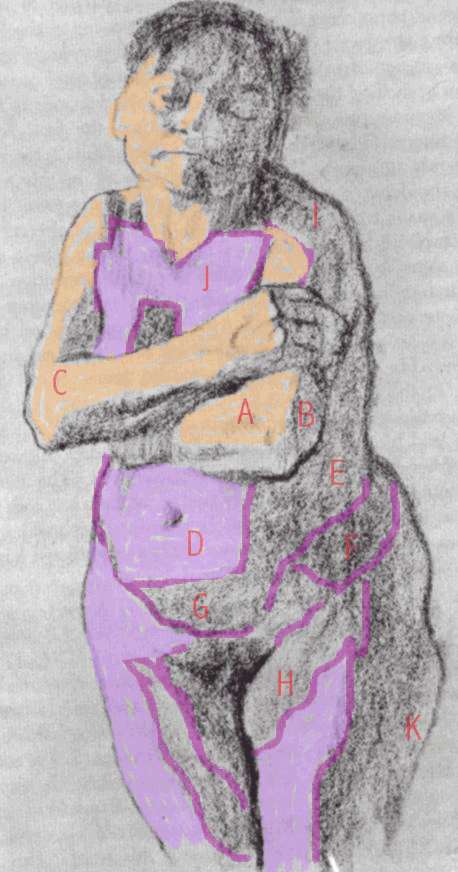last revision jan: 16 2000

the art information gallery
|
last revision jan: 16 2000
|

the art information gallery |
| return to: drawing theory | return to: my commented drawings |
Illustration Drawing no. 1
 |
 |
| Drawing By:
Jean Francois Millet (1814 - 1875) |
Pen and Brown ink
8 x 6.5 in approx National Gallery of Canada Ottawa |
Notice how in this drawing by Millet he uses simple forms, (all of which can be traced back to variations on the cone, sphere, and cube), to build his images. Study these drawing looking for simple plastic shapes and then study the drawin below in the same fashion. Both are master drawings, and it is your objective to be able to describe why a drawing is a master drawing - don't think you can achieve this discriminating eye in just a year or two of study.
Illustration Drawing no. 2
 |
 |
Scanned drawing from a book titled "The Language of Drawing" by Edward Hill a spectrum book : prentice-hall 1966 Library of Congress no.66-28111 |
I selected this drawing example because:
1) It does not cater to the cult of young and erotic which is not the objective of fine art.
2) It is a master quality drawing that deals with revealing form. (form refers to a three dimensional aspect)
3) If you can appreciate the form quality of this drawing then you have made progress otherwise start over you are not yet mature enough to be a real artist.
4) It is more literal than the Millet drawing above yet is shows all the same principles of conceptualizing form, but it has mor minor forms which are subordinated to the major forms, which are more evident in Millet. Even though this drawing contains more minor forms they do not destroy the major forms and that is essential to good drawing.
Two graphics are displayed In the above table - the right cell is the same drawing as in the left cell, only with coloured sections and alpha characters to designate areas that will be described as follows:
The coloured areas represent planes that are brought foreward, from the flatness of the paper, by their shape.
I have used more planes to analyse this drawing but the under structure is very similar to Millet. Note the arms in both drawing are very definite strong forms.
Notice how section "C" forms a "V" shape that
as moves foreward. Note how the "V" shape bends towards the elbow to create
a secondary plane. There is a little shading on the back of the hand, just
enough to indicate veins, but not enough to destroy the overall shape.
Note the use of shadow on the "C" section how
it gives strength to the form yet has transparent qualities to prevent
it from becomming a detached shape.
Note section "A" how it links up with the "C" section to form a larger unit, yet moves in front of the "V" shape. "D" acts like a platform for the womb area yet stays behind the elbow plane described at area "A" That platform shape at "D" is part of a larger mass that extends up through the breast area to the sholders. If you study it closely you will see that entire section was conceived as one great mass that wraps around the side shadows and sits in the pelvic bowl. This is powerful drawing.
The subordination of minor forms to the major form masses, coupled with the ability to hang flesh on delecate bone structures, and project the mood of an old woman who no longer cares about youth's vanity, but closes her eyes as if to see again how pretty she was. The drawing contains that importiant element of humanity. It says something about the human condition, and that raises it above all it's aesthetic merits.
Remember to note the use of (PLP's) and (EDS's) in both above drawings - see my drawings (note book section)
Reommended exercise:
Compare drawings by a variety of masters and try to see the form similarities between them. In the above drawings the medium Millet used lent itself to broad lines and thus general forms, whereas the medium Kollwitz used lent itself to very fine lines and thus a building of composite forms.
Remember drawing is the application of (PLP's
and EDS's) to achieve a human expression.
| click here for a sample of my own commented drawings |
**************this is my stop point
for this session*****************